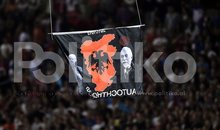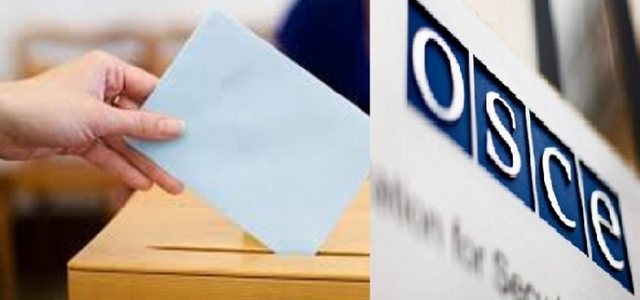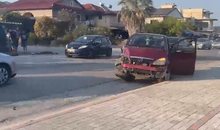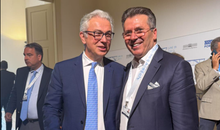
 Flash News
Flash News
"We witnessed the distribution of money outside the polling station" / OSCE / ODIHR releases report on April 25: Ministers and President campaign

The OSCE / ODIHR has published this Monday the final report on the findings of the voting process for the April 25 parliamentary elections in Albania.
"The ruling party gained significant advantages from being in power, including through control of the local administration and from misuse of public administration resources. This was amplified through positive media coverage of state institutions. Allegations of vote buying were persistent during the campaign. "A large number of investigations were launched. In the limited number of polling stations and counting stations observed, the process was largely transparent and smooth." stated at the beginning of the report.
Regarding the new Electoral Code, it states: "Although a number of ODIHR and Council of Europe recommendations were addressed during the electoral reform, some recommendations remain unaddressed."
The ODIHR raises concerns about vote-buying allegations and the leak of personal data to patronage workers. He also stressed that the campaign focused on the main party leaders and not on discussions about real issues.
"The campaign lacked momentum, as the messages focused on key party leaders rather than discussions on real issues. Widespread vote-buying practices continued to be a problem. Sensitive personal data leaks, including political preferences, continued. of voters is a serious concern and makes
voters vulnerable. " the report states.
Regarding the decision where party leaders are allowed to run in 4 constituencies, the ODIHR sees it as a problem of not running on equal terms.
"The law allows only party leaders, but no other candidate, to run in up to four constituencies, while other candidates can run in only one constituency, which is a violation of the right to run on equal terms . "
The report states that the ministers were involved in the campaign during their official engagements, giving the ruling party an advantage, while the President campaigned against the ruling party. The pressure on the public administration is also emphasized.
"Pavarësisht një kuadri ligjor solid që ndalon shpërdorimin e burimeve administrative dhe minimizon avantazhin e partisë në pushtet, ministrat vazhduan të bënin fushatë gjatë angazhimeve zyrtare. Publiciteti që erdhi si rrjedhojë e kësaj i dha partisë qeverisëse një avantazh të konsiderueshëm. Ofrimi i stimujve dhe presioni i pretenduar ndaj nëpunësve civilë përbënë shqetësim. Në kapacitetin e tij zyrtar, Presidenti bëri fushatë kundër partisë qeverisëse."
"Subjekteve u kërkohet të paraqesin raporte financiare vetëm pas zgjedhjeve, duke e kufizuar në këtë mënyrë transparencën dhe mundësinë e zgjedhësve për të bërë një zgjedhje të informuar dhe të bazuar tek informimi mbi burimet e fondeve të
fushatave." thuhet ndër të tjera në raport.
Sa i përket medias, në raport thuhet: "Mjedisi mediatik është i ngarkuar. Pavarësia editoriale ndikohet negativisht nga interesat e pronarëve, gjë që nxit autocensurën. Gazetarët vazhdojnë të mbeten vulnerabël ndaj presionit dhe korrupsionit. Rregulloret që rregullojnë mbulimin mediatik të fushatës e ngushtojnë aksesin në media të partive më të vogla dhe të kandidatëve të pavarur. Transmetuesit u frenuan nga bërja e një mbulimi të thelluar dhe analitik të të gjitha subjekteve zgjedhore. Kjo, e kombinuar edhe me përmbajtjen e prodhuar nga vetë partitë në programet informative, e kufizoi mundësinë e zgjedhësve për të bërë zgjedhje të informuara. Fatkeqësisht, nuk u organizua asnjë debat televiziv mes drejtuesve politikë."
According to the ODIHR, 30 cases related to vote buying are under investigation. The report also noted that the International Election Observation Mission (IEOM) witnessed a case of money laundering outside a polling station.
The report also states that overall, COVID-19 prevention measures were not well implemented and social distancing was not always respected. According to the ODIHR, the process was largely transparent and smooth.
Dokumenta bashkëngjitur
Latest news


Not only the body, swimming also helps the brain
2025-07-05 21:02:49
"Be careful with the water", Alimehmeti warns about the health risks of summer
2025-07-05 20:39:10
PSG beats Bayern Munich 2-0, advances to Club World Cup semifinals
2025-07-05 20:19:38

Two vehicles collide on the Elbasan-Peqin axis, drivers injured
2025-07-05 19:26:29

What does Zelenskyy have more than Zegjineja?
2025-07-05 18:45:26

Fiscal peace, but at a cost
2025-07-05 18:00:10
'Bankers' tax evasion, Chinese CEO and former director jailed
2025-07-05 17:39:21
Kyle Walker joins English club on two-year deal
2025-07-05 17:20:24
Two cars collide on the Saranda-Delvina axis, 4 injured
2025-07-05 17:05:29
Touching gesture! Liverpool will pay Jota's family's salary until 2027
2025-07-05 16:45:18
The zodiac signs that cheat most often
2025-07-05 16:25:53

"I asked for the dismissals", Dredha tries to soften Rama's 'blow' in Vlora
2025-07-05 15:48:49
Bomb threat in Parliament, prosecutor: It was a lie
2025-07-05 15:22:28

Bardhi: The recount revealed how greedy Zeqine Balluku is in stealing
2025-07-05 14:44:29
Knife wound on the secondary road Tirana-Durrës, perpetrator sought
2025-07-05 14:37:54
Tears and pain, Diogo Jota is escorted to his final home
2025-07-05 14:21:34
Success starts with yourself! Simple ways to invest in personal development
2025-07-05 13:58:50
Unlicensed firearms found in apartment, 50-year-old arrested in Lushnje
2025-07-05 13:43:11

Tirana Court remands Skerdi Sina to prison
2025-07-05 12:59:34
Cocaine laboratory in Greece, here are the Albanians arrested and wanted
2025-07-05 12:40:16
Directed Justice/Vangjeli: SPAK does not investigate any scandal involving Rama
2025-07-05 12:22:03

Bomb alert, Police remove MPs and media from Kosovo Parliament building
2025-07-05 11:48:16
"The will of the people" and the irony of ordered resignations
2025-07-05 11:32:05
Summer drowning risk: How to enjoy the water without risking your life
2025-07-05 11:20:27
Fire situation in the country, 16 fires reported in 24 hours, 4 still active
2025-07-05 11:07:04
Car hits pedestrian at white lines, injured in serious condition in Vlora
2025-07-05 10:59:58
Mosquito-borne diseases are a growing problem in Europe
2025-07-05 10:44:13



One of Sweden's most dangerous and wanted criminals arrested in Turkey
2025-07-05 09:38:29
Foreign exchange/ How much foreign currencies are bought and sold today
2025-07-05 09:18:38

"Don't be influenced by the opinions of others", today's horoscope
2025-07-05 08:40:50

Morning Post/ In 2 lines: What mattered yesterday in Albania
2025-07-05 08:02:07

Trump says he's ready to raise tariffs to 70% on some countries
2025-07-04 22:35:52
Tre shenjat e zodiakut që do ‘pasurohen’ në Korrik
2025-07-04 22:05:09
Gaza War: Hamas Accepts US Proposal for 60-Day Ceasefire
2025-07-04 21:50:10
Autocracy in Albania, Fuga: Governance has gotten out of control
2025-07-04 21:40:51
Meta: Agriculture on credit, the new fraud!
2025-07-04 21:26:39




Vote recount in Durrës ends without changes
2025-07-04 20:12:54
Gas station explodes in Rome, 25 injured (VIDEO)
2025-07-04 20:00:20

These afternoon habits often sabotage weight loss
2025-07-04 19:39:28
Former Arsenal player Thomas Partey accused of rape
2025-07-04 19:24:21
Shepherd disappears without a trace in Delvina
2025-07-04 19:14:31

Bardho gave Zegjine's mandate/Braho: Unfair! It violates the electoral system
2025-07-04 19:01:08


Rapid developments in the Sultanates!
2025-07-04 18:00:06



Italy tightens rules for skateboard traffic
2025-07-04 17:20:18

Unusual for the time, dense fog covers the coast of Vlora
2025-07-04 16:48:01


Accident on the Shkodra-Lezhë axis, one dead and 3 injured
2025-07-04 16:14:19
Albania with fewer requests for asylum and Albanian citizenship in 2024
2025-07-04 16:06:57

Albania last for quality of life, DP: Technical government is the solution!
2025-07-04 15:42:30
Nico Williams says "No" to Barcelona, signs with Athletic Club until 2035
2025-07-04 15:33:35
Fires in the country, four fires are still active, what is the situation?
2025-07-04 15:24:20

Summer brings big changes for these 4 zodiac signs
2025-07-04 15:00:04
Osmani: MPs need to agree to a secret ballot for the Speaker of Parliament
2025-07-04 14:51:09
Serious accident on the Peqin-Elbasan axis, two injured
2025-07-04 14:37:56

GJKKO leaves in force the security measure for the head of the KPP
2025-07-04 13:58:17
Who will replace Ilir Meta and take over the leadership of the PL?
2025-07-04 13:50:36
Berisha: Dismissal of directors in Vlora, another act of 'scapegoats'
2025-07-04 13:41:46




Librazhd/ In a serious psychological state, the young man consumes pesticides
2025-07-04 13:05:07


Weapons trafficked from Kosovo to Albania, two arrested, 8 pistols seized
2025-07-04 12:33:28
Konsumimi i tepërt i çokollatës, ja cilat janë dëmet që shkakton në organizëm
2025-07-04 12:23:35

Fires in the country, 21 fires in the last 24 hours, 4 still active
2025-07-04 12:00:19
WB calls for debt transparency: Albania to publish details of every loan
2025-07-04 11:50:05
